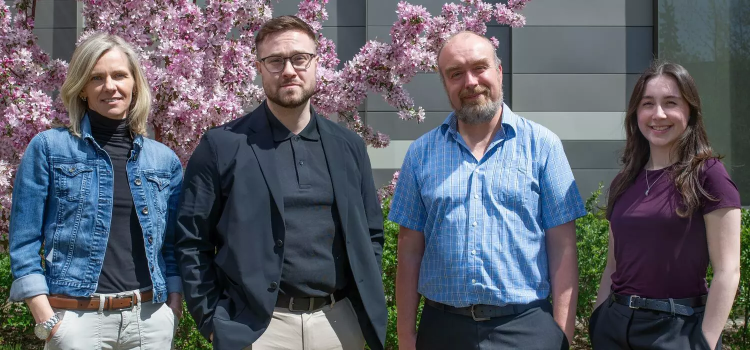When economics student Chloe Haley signed up to be a student leader with the Peer-Assisted Study Session (PASS) Program, she knew she'd be supporting fellow students through a challenging course. What she didn't expect was how much the role would change her.
Administered by the Chancellor Cuthbertson Student Success Centre, the PASS program provided Haley with the chance to develop her unique mentorship style, strengthen public speaking skills, and join a peer learning support network that spans generations of cohorts.

From left: Lucia Vojtassak, Jacob Graham, Steve Mason, and Chloe Haley Taylor Institute Staff
"It was a little intimidating at first," she says, "but really exciting."
Her experience is one of many that speak to the program's transformative influence not only for the students it supports, but for those who lead it.
In February, the PASS program received a University of Calgary Teaching Award recognizing the contributions of non-academic, full-time staff who support student learning experiences.
Through cross-campus collaboration and peer mentorship, PASS is building academic community, fostering future changemakers, and redefining how we think about student support.
What is PASS?
PASS is a free, student-led academic support program that targets some of the most challenging courses. Unlike reactive academic support interventions, PASS uses a proactive, course-focused model that works to improve outcomes before students reach a point of struggle. PASS leaders trained, high-performing students who have been successful in the course design structured weekly study sessions to align with the course lecture schedule.
The impact is measurable with PASS participation associated with increases to overall course grades and significantly reduced rates of Ds, Fs, and Withdrawals. As the program follows courses, rather than being targeted at individual students, it removes the stigma of seeking academic help. Regardless of a student's position in the grade strata, PASS provides a supportive, low-commitment environment to seek help .
Beyond academic performance, PASS helps students find community and develop more effective learning strategies. According to Steve Mason, Manager of Learning Support Programs, the program engages students in learning what he calls the hidden curriculum; skills such as collaboration and metacognition that aren't explicitly taught but are crucial to long-term success.
"We need to teach students how to learn, not just what to learn," adds Mason.
Recognition of the program's acknowledges its contribution to UCalgary's experiential learning (EL) initiatives, which encourage every student to have at least two EL experiences before graduation.
As economics undergraduate program director Dr. Lucia Vojtassak says, "PASS makes the case for co-curricular EL by offering students paid employment where their learned skills intersect with academic learning, multiplying their impact."
The economics department is now exploring how PASS's peer learning model can expand into curriculum. Dr. Vojtassak explains that the goal is not to make challenging courses easier; it is to facilitate student engagement as early as the first year of studies.
"We've learned that students learn best from each other," she says. "We're now thinking of how to reach students sooner, and how we can train TAs [teaching assistants] with a similar approach."
Student perspective: Chloe Haley
Chloe Haley, a third-year economics major and current PASS leader, facilitates weekly sessions for ECON 301, a notoriously tough course for undergraduates. Her sessions begin with warm-up activities definitions, reflections on last week's material, or open discussion of what students found interesting and challenging and then shift into problem-solving using worksheets based on the most recent lecture content.
"It's not about being a second lecturer," she explains. "It's about facilitating and assisting the study process." Chloe adjusts her leadership style depending on the group dynamic; talking more with quieter students to draw them out or stepping back when friend groups take the lead.
Being a PASS leader has enhanced her communication skills and deepened her subject knowledge.
"Through leading the sessions, I definitely built up confidence in my own abilities and also my ability to communicate information to other people." She says, "It has not only solidified my understanding of the concepts, maybe that I didn't understand as well the first time, but it's also helped me apply what we've learned in my higher-level classes."
From PASS leader to instructor: Jacob Graham
Jacob Graham, now a sessional instructor in the Department of Economics, started his journey as a PASS leader during his undergraduate years at UCalgary. The experience not only shaped his teaching style but drew him back to join the faculty as an instructor.
"I always had an idea that I was going to teach." he says. "My experience as an undergrad was phenomenal [...] I want to pay it forward to folks who are students now, because I feel as though there was a genuine, intense effort made to better our education."
As an instructor, Jacob remains connected to PASS. He mentors current leaders, including Chloe, and emphasizes student thinking in his teaching. "It's not enough for a student to demonstrate the answer," he explains. "It could be that they guessed, or I was tipping my pitches. To get a student talking about their thinking process shows me did we cover all the bases we needed to get to?"
He notes how the most rewarding moments of instruction are refined in peer-based learning, the ability to validate a student's learning approach, sharing a passion for the subject matter, and most importantly, the lightbulb moment of understanding.
"At its very basis, stripping away everything else, that's education. You can learn at least one thing from anybody."
The program's legacy
PASS didn't set out to build a generational legacy, but once leaders began sharing skills and strategies across cohorts, program designers leaned in, making an effort to build intentional leadership pathways for student leaders.
As the program looks to expand beyond its current collaborations and into more faculties and departments, the focus remains on partnership.
"We're showing what students can do when we give them resources and structure," Steve says. "We're not asking what we can do for students, we're asking what we can do with them."












